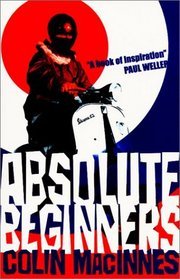
Absolute Beginners is remarkable - a dream of a novel. It is fast-paced, sweet-tempered, open-hearted, a golden book in many ways – a paean to youth, to a future brimming with possibility, to a present that is lived vibrantly and joyfully. It is also about selling out, junkies, prostitution, and race wars. How can this be? I suppose it is all about point of view, and the protagonist’s perspective is the embodiment of Live Now and Love It. This is one of those rare novels that make the reader feel even more alive by reading it. The enthusiasm of its narrator was equaled by my enthusiasm of the world that MacInnes plunges us into headfirst. It depicts, it mocks, it leaps forward, it grabs your hand and carries you along.
I was young once, gosh, just a decade or so ago. or more. I lived a life full of punks, hippies, goths, ravers, djs, fags, dykes, trans girls & guys, straight guys who made out with other guys and straight girls who were angry and ardent feminists, vegetarians and vegans, girls who stripped for cash in dives and guys who waved their hard-ons for free in print, fighters and peacemakers, guys who carved symbols on their bodies and girls who dressed like vampire princesses; we lived in junked-out flats filled with too many people, we shared clothes and went on road trips and had neverending parties and made protests against the government and danced all night and consumed amazing amounts of booze and drugs and sex and live music. I read Absolute Beginners during that period, and one of the best things about this novel was that it felt completely real and true to me, despite the difference in social scenes that were separated by decades, by an ocean. It showed the true diversity available to people in their late teens, in their 20s; it illustrated – and so nonchalantly – values that were not just held dear, but were unspoken, values that defied the middle class and that were simply assumed to be shared by everyone we knew. To read oneself and one’s peers in a novel written in 1958 is something special, something wonderfully moving to contemplate, even many years later.
What lifts Absolute Beginners above the idea that life for the young and unencumbered can be a great time, a fun carnival, is its complete awareness that this is also rather an illusion, and a crushingly temporary one at that. So many wonderful things can happen, so much excitement – and yet the world around this world still exists to be fought against. For me and my friends, that world to rail against did not just include asshole yuppies who came to our neighborhoods from time to time, it included police brutality, the WTO, the wars abroad. In Absolute Beginners, that world above includes race warfare. "Race" is clearly interwoven throughout the narrative, and yet it is one of so many things that the narrator is aware of, just one facet of the world that the narrator comments on... the reader could almost lose sight of it. But race and racism are there the entire time and slowly but surely become the whole point; by the end, the reader and the protagonist see how fragile a life full of living can be when the world is singling out his peers for destruction, and those peers are turning to him for alliance. The protagonist chooses, and chooses well. But it marks an ending of sorts, an ending of an attitude and a lifestyle, and the beginning of an understanding that no matter what he and his peers have built, he lives in the world still, as does everyone, and that world is one of both wonder and horror.
No comments:
Post a Comment